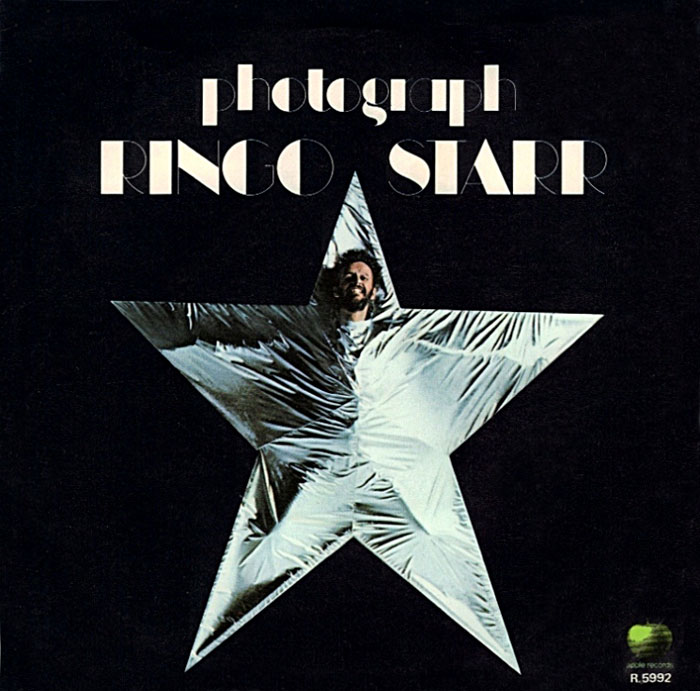In The Number Ones, I'm reviewing every single #1 single in the history of the Billboard Hot 100, starting with the chart's beginning, in 1958, and working my way up into the present.
Ringo Starr - "Photograph"
HIT #1: November 24, 1973
STAYED AT #1: 1 week
How do you think John Lennon felt about the fact that Ringo Starr had a #1 single before he did? Before sitting down to do the research on Ringo's "Photograph," I'd been wondering about that. As it turns out, we actually know the answer: Lennon was proud. He was happy.
As Fred Bronson points out in his extremely valuable and well-researched Billboard Book Of Number 1 Hits, Lennon addressed the Ringo question in a 1975 interview on Tom Snyder's late-night talk show Tomorrow. In that interview, Lennon admits that he and the other Beatles were a bit worried about Ringo when the band broke up: "[Ringo] didn't have that much of a writing ability, and he wasn't known for writing his own material. And there was a bit of a worry that, although he can make movies, how was his recording career going to be? And in general, it's probably better than mine!"
It's hard to overstate the level of goodwill Ringo Starr generated during his years in the Beatles. Starr, the last Beatle to join the band, was a great drummer, of course. He had to be. He was great in ways that weren't always easy to perceive; his subtle little in-the-pocket adjustments really drove some of those songs. But "great drummer" wasn't really Starr's public persona. Instead, he was the permanently bemused Beatle, the one who'd constantly make smart-dumb Yogi Berra aphorisms and keep the rest of the band entertained. Ringo was essentially the hero of A Hard Day's Night, and he was funny in ways that didn't always seem intentional. He was the only Beatle who seemed even vaguely normal, which made him more beloved. It was like if your goofiest friend had somehow stumbled into joining the most important band in the world. He got to sing one song per album, and he was happy with that.
Ringo Starr's solo stardom was never assured, if only because he didn't have the attention-demanding personality type that seems like a prerequisite for stardom. And for a while after the Beatles, Ringo seemed to be languishing. He played on records from his ex-bandmates Lennon and George Harrison. He acted in a few movies, mostly comedies: Candy, The Magic Christian, a 1971 spaghetti Western called Blindman. He directed Born To Boogie, a documentary about T. Rex. He made an album of jazz standards and a country album, both of which predictably flopped. And so when Starr blew up with "Photograph," it must've been a pleasant surprise for everyone, not least Ringo himself.
Ringo co-wrote "Photograph" with George Harrison. The two of them were staying on a yacht that Ringo had rented for the Cannes Film Festival. It's a breakup song, a tale of a guy mooning about a lost love and staring at the pictures that are all he has left. But it's also, more generally, a song about nostalgia, about missing better times. Maybe it was, in its own way, a song about missing the Beatles. Or maybe that's just how the world heard it. It's a pretty simple song, and it seems pretty likely that nobody would care about the song if they didn't already care about the guy singing it. But they did care about the guy singing it. They still do.
Starr sang and played drums on the song, and Harrison played guitar and sang backing vocals. They used a lot of the same session-musician assassins that Harrison was using on his own records around the same time: Nicky Hopkins, Jim Keltner, Klaus Voormann. Phil Spector's old collaborator Jack Nitzsche did the arranged the strings and the choral backing vocals, while producer Richard Perry did everything he could to replicate Spector's echo-chamber wall-of-sound technique.
There's all this musical beauty at work on "Photograph": The soaring strings, the hammering pianos, the deep twang of the acoustic guitar, the buried-in-the-mix castanets. There's a Bobby Keys saxophone solo that manages to honk bittersweetly, which can't be easy. Like so many Spector productions, it's almost overwhelming in a profoundly satisfying way. And it sounds like an early-'60s song, right down to the sax solo, which probably had a lot to do with its success.
But then there's Ringo himself. As a singer, Ringo Starr is a great drummer. He's got a flat, uncommunicative honk, the sort of instrument that you can't really trust to carry a song. And Perry doesn't really trust him to do it. Perry surrounds Starr with backing vocals and orchestral embellishments, almost drowning him out. And Ringo sings it with a big enthusiasm that belies his lack of skill. So it's almost like you're hearing an old friend drunkenly sing along with a lavishly produced pop song -- like Ringo is already doing slurry karaoke on his own song. And that's what works about "Photograph." That's its charm. It's the kind of mediocrity you can feel good about because, just like John Lennon, you're rooting for the guy who made it.
GRADE: 6/10
BONUS BEATS: Here's the "Photograph" cover that college-rock kings Camper Van Beethoven included on the 1987 EP Vampire Can Mating Oven:
BONUS BONUS BEATS: Here's the cover of "Photograph" that Adam Sandler, the Ringo of the early-'90s SNL cast, included on the soundtrack of the 2009 Judd Apatow movie Funny People:






